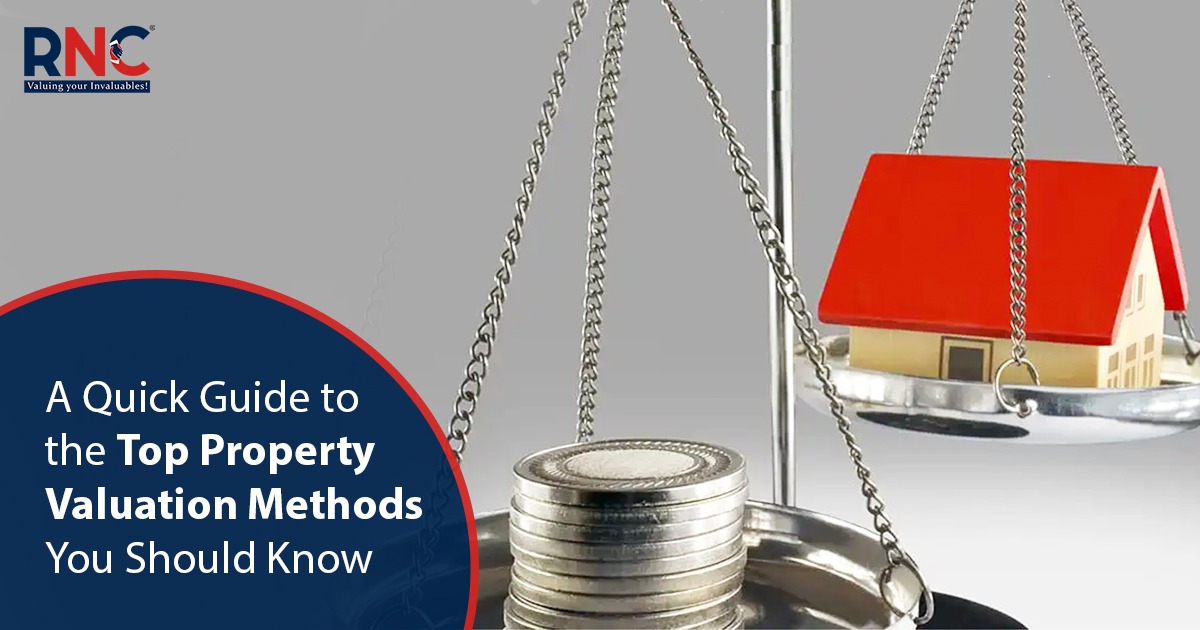
Property valuation is the backbone of every real estate decision — from buying a house to securing a loan or planning an investment.
With the evolving property market in 2025, understanding how valuations are done can save you from underpricing your assets or overpaying for property.
Whether you’re a homeowner, builder, or institutional investor, having clarity on the valuation methods used by professionals like RNC Valuers helps you make informed, data-driven decisions.
In this guide, we’ll break down the top property valuation methods in 2025, explain how they work, and help you identify which method suits your property best.
What Is Property Valuation?
Property valuation is the process of estimating the fair market value of real estate based on measurable factors such as location, demand, depreciation, and future income potential.
Valuation is essential for:
-
Property purchase or sale
-
Loan approval or mortgage
-
Taxation and insurance
-
Mergers, acquisitions, or joint ventures
At RNC Valuers , our experts use a combination of scientific models, data analytics, and field experience to ensure accuracy and regulatory compliance.
Why Accurate Property Valuation Matters in 2025
The Indian real estate market is becoming increasingly data-driven. Banks, investors, and regulators demand accurate valuations for transparency and compliance with RERA and IFRS standards.
A well-executed valuation:
-
Protects buyers and sellers from mispricing
-
Helps investors assess return potential
-
Supports banks in loan underwriting
-
Aids tax authorities and auditors in asset reporting
Example: A 10% error in valuation can change the return on investment (ROI) by as much as 30% in a long-term property deal.
What Determines the Value of a Property?
There are multiple factors that determine the value, such as:
- Location: Properties that are in urban areas or closer, properties that have a view and better connectivity all have a higher value than those that do not.
- Infrastructure: The infrastructure, its features, and plinth are all determining factors of the value of a property.
- Frontage: What the property is facing is something people can be choosy over, thus heightening the price of the property
- Level: If the property you are planning to buy or sell is higher up the building or lower, there is a difference in value.
- Shape: The shape of the plot is crucial when it comes to valuation. This is also important in terms of the building as Vastu is a major factor when it comes to property building and transactions.
- Legal Embroilement: There is a significant drop if the property in question has legal issues surrounding it.
- Safety: The safety of infrastructure, the land it is on, and the surrounding areas all play an important role in determining the value of the property.
Top Property Valuation Methods in India
Let us now look at the different approaches taken to evaluate a property. It should also be kept in mind that the method taken also differs depending on the purpose at hand.
Top Property Valuation Methods Used in 2025
Here are the five most reliable valuation methods recognized by professionals and regulators worldwide.
| Method | Description | Ideal For |
|---|---|---|
| 1. Sales Comparison Approach (SCA) | Compares the property to recently sold similar properties in the same locality. | Residential and land valuation |
| 2. Income Capitalization Approach | Values property based on its income-generation potential (rent or lease). | Commercial and rental properties |
| 3. Cost Approach | Calculates property value based on cost to rebuild, minus depreciation. | New constructions or specialized assets |
| 4. Development Method | Used for land or under-construction projects by estimating future value after completion. | Builders, developers |
| 5. Residual Method | Determines land value by subtracting development and profit margins from gross value. | Mixed-use and large development projects |
Learn more about our professional valuation process → Real Estate Valuation Services
City-Wise Valuation Trends 2025
| City | Avg. Rate per sq.ft (₹) | Key Trend | Growth (YoY) |
|---|---|---|---|
| Mumbai | 17,000–35,000 | Redevelopment boom | +7% |
| Delhi NCR | 9,000–18,000 | Rise in mixed-use projects | +5% |
| Pune | 6,000–12,000 | IT-driven realty expansion | +8% |
| Hyderabad | 7,000–14,000 | Affordable luxury demand | +6% |
These trends indicate why localized expertise is vital for accurate property valuation.
AI and Technology in Property Valuation (2025)
AI and big data are revolutionizing valuation accuracy.
-
Satellite data and GIS tools help assess location and infrastructure impact.
-
Machine learning models predict future price trends and rental yields.
-
Automated Valuation Models (AVMs) improve speed and consistency.
“At RNC, we use hybrid valuation models combining AI insights with human expertise — ensuring accuracy and context in every report.”
— RNC Real Estate Valuation Expert
FAQs
1. What is the best method for property valuation in India?
The Sales Comparison Approach is most commonly used, but for income-generating assets, the Income Capitalization Method gives more accurate results.
2. How often should property valuation be done?
Ideally every 2–3 years, or whenever there’s a significant change in property condition or market value.
3. Which factors influence property value the most?
Location, infrastructure, demand-supply balance, and property age are key factors affecting valuation.
4. Can AI tools replace valuers?
No. AI supports valuers by offering data insights, but expert judgment is essential for interpreting results within local and regulatory contexts.
Conclusion
In 2025, property valuation is no longer just about square footage and locality — it’s about data, precision, and expertise.
Understanding these valuation methods empowers you to negotiate better, invest wisely, and comply with financial standards.
🏡 Need an accurate property valuation report?
Book a Consultation with RNC Valuers

About the author:
Sahil Narula
Sahil Narula is the Managing Partner at RNC Valuecon LLP and a Registered Valuer with IBBI. He brings over a decade of experience in Valuation Services, Corporate Finance, and Advisory, having led numerous complex assignments under the Insolvency & Bankruptcy Code, 2016, Mergers & Acquisitions, Insurance, and Financial Reporting.
He is a regular speaker at national forums (ASSOCHAM, CII, ICAI, IBBI, Legal Era) and currently serves as Co-Chairman of ASSOCHAM’s National Council on Insolvency & Valuations and a member of CII’s Task Force on Insolvency & Bankruptcy.
🤝Connect with Sahil on LinkedIn.
